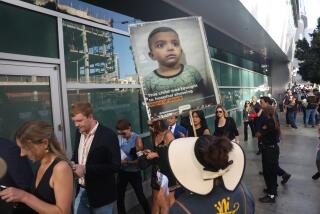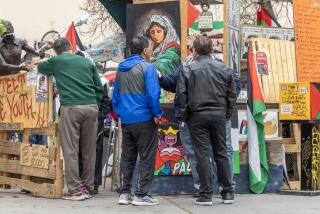Seattle Shrugs at Eclectic Mix of Protesters
- Share via
SEATTLE — French philosopher Voltaire said it this way: “I have never made but one prayer to God, a very short one: ‘O Lord, make my enemies ridiculous.’ ”
To judge by the lukewarm stew of protesters gathering at the opening sessions of the Asia-Pacific Economic Cooperation forum, somebody besides Voltaire has been praying hard.
Among the malcontents there may be many who represent the smart, the visionary and the just--but they suffer the indignity of being considered inconsequential.
Ever since the civil rights and anti-war protest movements shocked America’s reluctant political leaders with reminders that power really does arise from the people, demonstrations have become part of the American way of life. And compared with their predecessors, the protesters here are extremely gentle.
Bands of them, small and large, possessing leaflets and posters, search for a delegate, a stray TV camera, a place on the agenda. What they get for their efforts is indifference.
You would hardly know the power of protest from the response to demonstrators and supplicants at this event, the most high-powered international gathering on the West Coast in decades. Trade ministers and heads of government representing half the world’s population are here or en route.
Their own deliberations may not reorder the world, but they seem to have little time to spare for the likes of Anci Koppel and her aging friends.
Koppel is 86 years old, and back in November, 1961, she and a few dozen peaceniks greeted President John F. Kennedy when he came to Seattle for the centennial celebration of the University of Washington. They carried signs asking for an end to atmospheric testing of nuclear weapons.
Koppel is still working the streets today.
“But at this demonstration, strangely enough, we are going to be supporting the President,” said Koppel. That’s because President Clinton has refrained from resuming U.S. underground nuclear weapons tests even though the Chinese conducted one of their own this autumn.
A larger and more disaffected group of protesters is hoping to strengthen Clinton’s resolve to talk tough with the Chinese over human rights issues.
Adding to the hodgepodge are at least a dozen other causes, many of them with little or no connection to the APEC conference except in their desire to share the audience.
Why is there no crackle of excitement in the air outside the hotels and convention center of Seattle? A key part of the answer is that protesters are not locked out like they used to be.
So, can America just laugh off protesters?
“I don’t think so,” said William Rorabaugh, a University of Washington history professor and expert on American dissent. “Protest is a sign of alienation. In 1992-93, I see more protests than I did, say, in 1987.
“That says to me, just like the (Ross) Perot movement says to me, there is again a growing sense of alienation in our society.”
As India’s Mohandas Gandhi, a lasting inspiration for protest if there ever was one, said: “Almost anything you do will be insignificant, but you must do it.”
More to Read
Sign up for Essential California
The most important California stories and recommendations in your inbox every morning.
You may occasionally receive promotional content from the Los Angeles Times.










